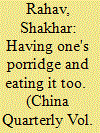| Srl | Item |
| 1 |
ID:
116494


|
|
|
|
|
| Publication |
2012.
|
| Summary/Abstract |
This article examines the "porridge incident," in which the renowned Chinese author, critic and former minister of culture Wang Meng sued a Communist Party literary journal for attacking him and his story "Hard Porridge" ("Jianying de xizhou"). The incident straddled the transitional period between 1989 and 1992 and illuminates the ramifications of structural changes in China's literary sphere. I frame the affair within two contexts: Wang Meng's tortuous career, which challenges dichotomies of bureaucrat vs. dissident, and the transition from a centralized literary sphere to a market-driven one. I argue that Wang's responses to the attack on him stemmed from a political and cultural standing that was the product of a Party-controlled cultural sphere, along with the opportunities offered by expanding reforms. The Deng-era reforms produced a divide between culture, markets and bureaucracy that would preclude cultural figures like Wang from holding such high bureaucratic positions anymore.
|
|
|
|
|
|
|
|
|
|
|
|
|
|
|
|
| 2 |
ID:
098336


|
|
|
|
|
| Publication |
2010.
|
| Summary/Abstract |
This article examines the contested drama of the epic quest of self-identity through a critical rereading of three works by Beijing writers from three different generations, describing Beijing life during three different time periods: Wang Meng's "Kite Streamers" (1979), Xu Xing's "Variations Without a Theme" (1985), and Chun Shu's Beijing Doll (2001). Wang Meng's protagonists occupy a limited space between their individual dreams and the tarnished collective ideals in the late 1970s. The groundbreaking stream of consciousness technique that Wang Meng ushered in illustrates a rupture between the repressive ideology of the past and an unconscious world of personal desires. Xu Xing's protagonist is forever wandering Beijing's streets, positioning himself on the margins of social space. His unfixed identity creates a detached, even schizophrenic, perspective while at the same time it empowers a subjectively critical engagement in the 1980s. Chun Shu (the name of both the writer and the protagonist), an icon of the so-called New New Human Being movement in 21st-century Beijing, who longs for a luxurious living space and celebrates the electronic euphoria, as this article argues, is nothing more than a cybernetic punk of post-modern consumerism and post-socialist nihilism.
|
|
|
|
|
|
|
|
|
|
|
|
|
|
|
|